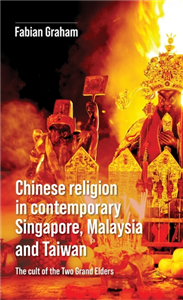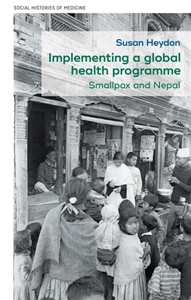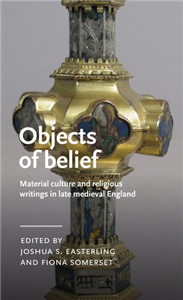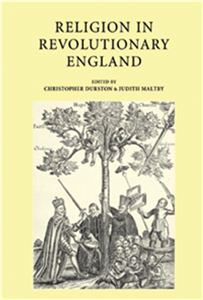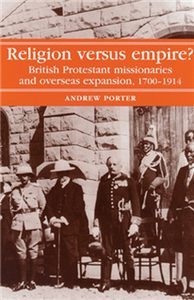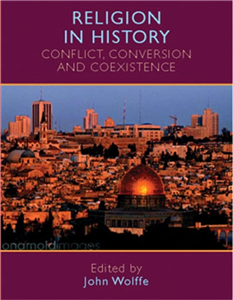Your Search Results
-
Belcastro Agency
Belcastro Agency is a full-service literary agency representing authors writing adult and young adult fiction. We are a passionate, hands-on, editorially-focused agency and work closely with our writers in developing manuscripts and proposals for submission. In addition, we actively manage subsidiary rights for the projects we represent including foreign translation, audio, and film/television rights.
View Rights Portal
-
Promoted Content
-
Promoted ContentHumanities & Social SciencesApril 2022
Chinese religion in contemporary Singapore, Malaysia and Taiwan
The cult of the Two Grand Elders
by Fabian Graham
In Singapore and Malaysia, the inversion of Chinese Underworld traditions has meant that Underworld demons are now amongst the most commonly venerated deities in statue form, channelled through their spirit mediums, tang-ki. The Chinese Underworld and its sub-hells are populated by a bureaucracy drawn from the Buddhist, Taoist and vernacular pantheons. Under the watchful eye of Hell's 'enforcers', the lower echelons of demon soldiers impose post-mortal punishments on the souls of the recently deceased for moral transgressions committed during their prior incarnations. Chinese religion in contemporary Singapore, Malaysia and Taiwan offers an ethnography of contemporary Chinese Underworld traditions, where night-time cemetery rituals assist the souls of the dead, exorcised spirits are imprisoned in Guinness bottles, and malicious foetus ghosts are enlisted to strengthen a temple's spirit army. Understanding the religious divergences between Singapore and Malaysia (and their counterparts in Taiwan) through an analysis of socio-political and historical events, Fabian Graham challenges common assumptions about the nature and scope of Chinese vernacular religious beliefs and practices. Graham's innovative approach to alterity allows the reader to listen to first-person dialogues between the author and channelled Underworld deities. Through its alternative methodological and narrative stance, the book intervenes in debates on the interrelation between sociocultural and spiritual worlds, and promotes the destigmatisation of spirit possession and discarnate phenomena in the future study of mystical and religious traditions.
-
 Trusted Partner
May 2002
Trusted Partner
May 2002Die Religion der Gesellschaft
by Niklas Luhmann, André Kieserling
Die Klassiker der Soziologie hatten die Religionssoziologie als einen zentralen Teil der Gesellschaftstheorie angesehen, und zwar auch und gerade dort, wo ihnen die moderne, angeblich so religionsfern gebaute Gesellschaft vor Augen stand. Der vorliegende Band, an dem Niklas Luhmann bis kurz vor seinem Tod gearbeitet hat, erneuert diesen Anspruch, indem er die Religion als autonomes Kommunikationssystem innerhalb der modernen Gesellschaft beschreibt.
-
 Trusted Partner
MedicineFebruary 2025
Trusted Partner
MedicineFebruary 2025Implementing a global health programme
Smallpox and Nepal
by Susan Heydon
Worldwide eradication of the devastating viral disease of smallpox was devised as a distant global policy, but success depended on implementing a global vaccination programme within nation states. How this was achieved remains relevant and topical for responding to today's global communicable disease challenges. The small and poor Himalayan kingdom of Nepal faced enormous geographical and infrastructure challenges if it was going to succeed in a nationwide vaccination programme. This book acknowledges the key role of the WHO but disrupts the top-down, centre-led standard narrative. Against a background of widespread internal political and social change, Nepal's programme was expanded, effectively decentralised and a vaccination strategy introduced that aligned with people's beliefs. Few foreign personnel were involved.
-
 Trusted Partner
Humanities & Social SciencesJuly 2021
Trusted Partner
Humanities & Social SciencesJuly 2021Critical theory and feeling
The affective politics of the early Frankfurt School
by Simon Mussell
This book offers a unique and timely reading of the early Frankfurt School in response to the recent 'affective turn' within the arts and humanities. Resisting the overly rationalist tendencies of political philosophy, it argues that critical theory actively cultivates a powerful connection between thinking and feeling, and rediscovers a range of often neglected concepts that were of vital importance to the first generation of critical theorists, including melancholia, hope, (un)happiness, objects and mimesis. In doing so, it brings the dynamic work of Walter Benjamin, Theodor Adorno, Ernst Bloch and Siegfried Kracauer into conversation with more recent debates around politics and affect. An important intervention in the fields of affect studies and social and political thought, Critical theory and feeling shows that sensuous experience is at the heart of the Frankfurt School's affective politics.
-
 Trusted Partner
Humanities & Social SciencesNovember 2022
Trusted Partner
Humanities & Social SciencesNovember 2022The religion of Orange politics
by Joseph Webster, Alexander Smith
-
 Trusted Partner
April 2000
Trusted Partner
April 2000Goethe und die Religion
Aus seinen Werken, Briefen, Tagebüchern und Gesprächen
by Hans-Joachim Simm
Hans-Joachim Simm, Dr. phil., geboren 1946 in Braunschweig, war bis 2009 Verlagsleiter des Insel Verlags und des Verlags der Weltreligionen.
-
 Trusted Partner
Trusted Partner
-
 Trusted Partner
Humanities & Social SciencesOctober 2020
Trusted Partner
Humanities & Social SciencesOctober 2020Religion, war and Israel’s secular millennials
by Stacey Gutkowski
-
 Trusted Partner
Literature & Literary StudiesOctober 2025
Trusted Partner
Literature & Literary StudiesOctober 2025Objects of belief
Material culture and religious writings in late Medieval England
by Joshua Easterling, Fiona Somerset
Objects in late medieval Europe were a means for lay people and clergy to negotiate their access to powers beyond the everyday, in folk practice as well as religious observance. As has been noted by scholars, this period is marked by a profusion of objects granted special importance, imaginary as well as material. These objects prompt reconsideration of cultural and intellectual frameworks, for example of superstition, reform, and heresy, that never quite successfully contain them. Essays in this volume center attention on these things themselves, from puppets to rosaries, as indeed do the written accounts through which they are often mediated. With a focus on England, contributors re-evaluate our understanding of works and authors including Geoffrey Chaucer, Walter Hilton, Nicholas Love, Julian of Norwich, miracles of the Virgin, Edward Hall's Chronicle, the Wycliffite Glossed Gospels, and the Croxton Play of the Sacrament.
-
 Trusted Partner
Trusted Partner
-
 Trusted Partner
Trusted Partner
-
 Trusted Partner
March 2006
Trusted Partner
March 2006Die Zukunft der Religion
by Gianni Vattimo, Richard Rorty, Santiago Zabala, Michael Adrian
Nicht erst seit der vielbeachteten Wahl des neuen Papstes, nicht erst seit den religiös motivierten Terroranschlägen, die die westlichen Demokratien erschüttert haben, und nicht erst seit der Wiederkehr religiöser Fundamentalismen in allen Teilen der Welt wird deutlich, daß die Frage der Religion zu einer Nagelprobe der Zivilisation geworden ist. Doch war die Religion nicht längst überwunden? Die Philosophen Richard Rorty und Gianni Vattimo, die als Vertreter einer dezidierten Metaphysikkritik nicht gerade in Verdacht stehen, dem Christentum das Wort zu reden, stellen die Frage nach der Zukunft der Religion. In pointierten Texten und einem anschaulichen Gespräch gehen sie von der Beobachtung aus, daß die Metaphysikkritik mitnichten zum Verschwinden der Religion geführt hat. Der Tod Gottes gehört der Vergangenheit an, die Religion nicht. Doch gehört ihr wirklich die Zukunft? Oder hat nicht vielmehr eine Verschiebung der religiösen Erfahrung stattgefunden, die eine Metaphysikkritik keineswegs ausschließt? Wird eine Religion ohne Gott kommen?»Was kommt nach dem Ende der Metaphysik? Kann Religion ohne Begründungen, objektive Wahrheiten oder Gott auskommen? Zwei der einflußreichsten Philosophen unserer Tage kommen hier zu einer Antwort zusammen. Gemeinsam bestimmen Vattimos Hermeneutik und Rortys Pragmatismus unsere Vorstellung der christlichen Botschaft, daß die Liebe das einzige Gesetz darstelle, neu.« Nancy Frankenberry
-
 Trusted Partner
August 1982
Trusted Partner
August 1982Funktion der Religion
by Niklas Luhmann
Die fünf Kapitel dieses Buches befassen sich mit der Religion unter verschiedenen, in sich zusammenhängenden Gesichtspunkten. Ihr Ziel ist es, Theorieerfahrungen aus verschiedenen Bereichen der Gesellschaftstheorie für die Beurteilung der gegenwärtigen Lage von Religion fruchtbar zu machen. Erörtert werden: (1) die gesellschaftliche Funktion der Religion, (2) die evolutionären Veränderungen ihrer Dogmatik, (3) die religiöse Thematisierung des Problems der Kontingenz, (4) Säkularisierung im Sinne einer religionsspezifischen Thematisierung der Gesellschaft als Umwelt des Religionssystems und (5) die Möglichkeiten der Organisation des Religionssystems selbst.
-
 Trusted Partner
Humanities & Social SciencesJanuary 2007
Trusted Partner
Humanities & Social SciencesJanuary 2007Religion in Revolutionary England
by Christopher Durston, Judith Maltby
This book offers a collection of essays tightly focused around the issue of religion in England between 1640 and 1660, a time of upheaval and civil war in England. Edited by well-known scholars of the subject, topics include the toleration controversy, women's theological writing, observance of the Lord's Day and prayer books. To aid understanding, the essays are divided into three sections examining theology in revolutionary England, inside and outside the revolutionary National Church and local impacts of religious revolution. Carefully and thoughtfully presented, this book will be of great use for those seeking to better understand the practices and patterns of religious life in England in this important and fascinating period. ;
-
 Trusted Partner
Colonialism & imperialismAugust 2004
Trusted Partner
Colonialism & imperialismAugust 2004Religion Versus Empire?
British Protestant missionaries and overseas expansion, 1700–1914
by Andrew Porter
This is the only book that addresses the relations between religion, Protestant missions, and empire building, linking together all three fields of studyby taking as its starting point the early eighteenth century Anglican initiatives in colonial North America and the Caribbean. It considers how the early societies of the 1790s built on this inheritance, and extended their own interests to the Pacific, India, the Far East, and Africa. Fluctuations in the vigour and commitment of the missions, changing missionary theologies, and the emergence of alternative missionary strategies, are all examined for their impact on imperial expansion. Other themes include the international character of the missionary movement, Christianity's encounter with Islam, and major figures such as David Livingstone, the state and politics, and humanitarianism, all of which are viewed in a fresh light. This monumental study shows that the missionary movement had a far more complex and ambiguous relationship with the Empire than has previously been thought, and will be widely welcomed by students and scholars of imperial history and the history of religion.
-
 Trusted Partner
Humanities & Social SciencesNovember 2004
Trusted Partner
Humanities & Social SciencesNovember 2004Religion in history
Conflict, conversion and coexistence
by John Wolffe
This is an integrated collection of essays by leading scholars that looks at issues of conflict, conversion and coexistence in the religious context since the third century. The range of topics explored include paganism and Christianity in the later Roman world, the Crusades, the impact of the Reformation in Britain and Ireland, subsequent Protestant-Catholic conflict, the Hindu Renaissance in nineteenth-century India, the Palestinian-Israeli conflict, Britain in the 1960s, women and the ministry, and Christianity, Judaism and the Holocaust. The book concludes by offering an historical perspective on religion, conflict and coexistence in the world today. Published in association with The Open University, this is a student-friendly and accessible volume on popular subjects within religious history, and it will be of value to students on a range of courses, as well as to a wider readership interested in the historical background to the role of religion in the contemporary world. ;
-
 Trusted Partner
Humanities & Social SciencesJanuary 2024
Trusted Partner
Humanities & Social SciencesJanuary 2024The politics of feeling in Brexit Britain
by Jonathan Moss, Emily Robinson, Jake Watts
-
 Trusted Partner
Literature & Literary StudiesJanuary 2004
Trusted Partner
Literature & Literary StudiesJanuary 2004Theatre and religion
Lancastrian Shakespeare
by Richard Dutton, Alison Findlay, Richard Wilson
This important collection of essays focuses on the place of Roman Catholicism in early modern England, bringing new perspectives to bear on whether Shakespeare himself was Catholic. In the Introduction, Richard Wilson reviews the history of the debate over Shakespeare's religion, while Arthur Marotti and Peter Milward offer current perspectives on the subject. Eamon Duffy offers a historian's view of the nature of Elizabethan Catholicism, complemented by Frank Brownlow's study of Elizabeth's most brutal enforcer of religious policy, Richard Topcliffe. Two key Catholic controversialists are addressed by Donna Hamilton (Richard Vestegan) and Jean-Christophe Mayer (Robert Parsons). Robert Miola opens up the neglected field of Jesuit drama in the period, whilst Sonia Fielitz specifically proposes a new, Jesuit source-text for Timon of Athens. Carol Enos (As You Like It), Margaret Jones-Davies (Cymbeline), Gerard Kilroy (Hamlet) and Randall Martin (Henry VI 3) read individual plays in the light of these questions, while Gary Taylor's essay fittingly investigates the possible influence of religious conflicts on the publication of the Shakespeare First Folio. Theatre and religion: Lancastrian Shakespeare as a whole represents a major intervention in this fiercely contested current debate. ;
-
 Trusted Partner
May 2012
Trusted Partner
May 2012Der Rigveda und seine Religion
by Thomas Oberlies
Der Rigveda gehört zu den ältesten Literaturdenkmälern der Menschheit. In den rund 1000 Hymnen dieses Textes, der vermutlich zwischen 1500 und 1000 v. Chr. verfaßt wurde, fand eine am Opfer orientierte Religion ihren Niederschlag, die etwa seit 2000 v. Chr. aus dem heutigen Afghanistan nach Nordindien einwandernde vedische Stämme geformt hatten. Diese Religion ist einerseits indogermanischem Erbe verpflichtet, weist andererseits aber auch bereits den Weg zum Hinduismus. Thomas Oberlies zeichnet ihre Gottesvorstellungen, ihren Kultus und ihre Mythologie in allen Einzelheiten nach. Kosmologie und Jenseitskonzeptionen kommen ebenso in den Blick wie etwa die Gesellschaftsform und die Art der Herrschaftslegitimation.






